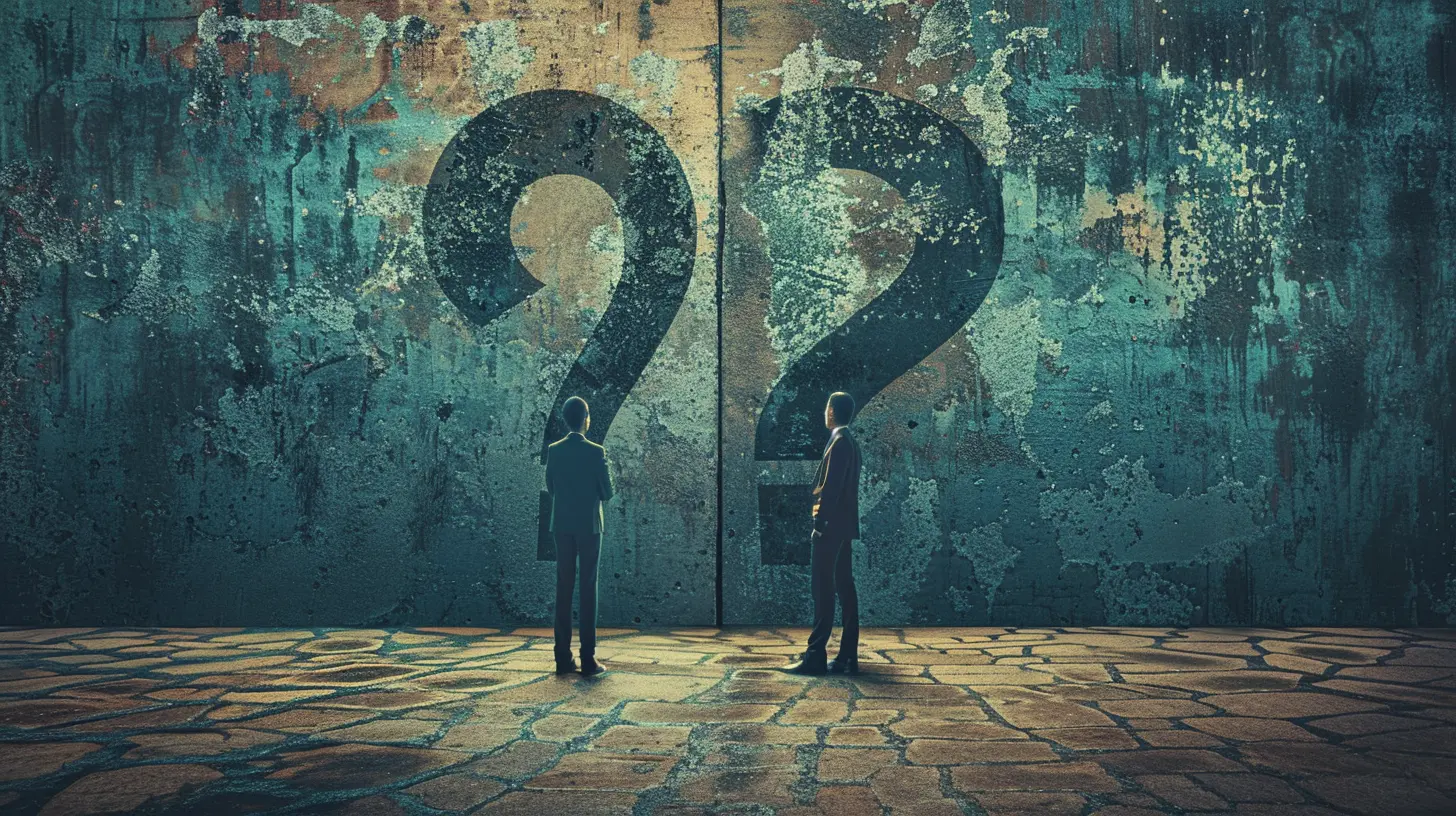4 December 2024
Ever made a decision that seemed absolutely rock-solid at the time, only to look back later and wonder, "What was I thinking?" If your answer is yes, don't worry, you're not alone! This happens to the best of us. And one of the sneaky culprits behind many of these head-scratching moments is something called confirmation bias.
Now, you might be asking: what exactly is confirmation bias? And how does it play such a significant role in the decisions we make? Well, buckle up because we're diving deep into the world of psychology, decision-making, and how our brains sometimes trick us into making mistakes we’re not even aware of.

What Is Confirmation Bias?
Let’s start with the basics. Confirmation bias is a cognitive bias that causes us to favor information that supports our pre-existing beliefs or values. In simpler terms, it's the brain's way of saying, “I already made up my mind, now give me evidence to support it!”Imagine this: you believe that eating chocolate every day is good for you (we can dream, right?). You go online to research the topic, but guess what? You’ll probably click on articles that say, “Chocolate is a Superfood!” or “Why Eating Chocolate Daily Can Improve Your Health" and completely ignore the ones that say, “The Dangers of Too Much Chocolate.” This selective attention is confirmation bias in action.
How Confirmation Bias Works
Our brains are hardwired to look for patterns and validate our beliefs. From an evolutionary perspective, this makes sense. Back in the day, trusting our instincts and sticking to what we "knew" was helpful for survival. But in our modern world? Not so much.Here’s how confirmation bias sneaks into your thought process:
1. Selective Search for Evidence: You actively seek out information that confirms what you already believe.
2. Interpretation of Evidence: Even if you come across opposing information, you’ll likely interpret it in a way that supports your viewpoint.
3. Memory Recall: You're more likely to remember facts and details that align with your beliefs and conveniently forget those that don’t.
See the problem here? When you’re only paying attention to information that validates your beliefs, you’re not getting a complete picture, which can lead to some pretty poor decision-making.

The Impact of Confirmation Bias on Decision Making
Have you ever wondered why people often stick to their guns even when presented with evidence that suggests they might be wrong? That's confirmation bias at play. It significantly affects our ability to make well-rounded, objective decisions. Let's explore how.1. Limiting Your Perspective
When you’re under the influence of confirmation bias, you narrow your focus to only the things that support your point of view. It’s like wearing blinders that prevent you from seeing the full landscape of a situation. This tunnel vision makes it difficult to consider alternative solutions or viewpoints.For example, let’s say you’re hiring someone for a job. You believe that candidates with a certain level of education are more qualified, so you focus solely on applicants with that criterion. However, by doing this, you may completely overlook candidates with diverse experiences or skills that could bring much more value to the table. Your bias limits your ability to make the best decision.
2. Strengthening of Incorrect Beliefs
Confirmation bias not only keeps you from seeing new possibilities but also strengthens your existing (and sometimes wrong) beliefs. Think of it like adding layers upon layers of paint on a wall. Each layer makes it harder to see what’s underneath, until eventually, the original surface is hidden.This is particularly dangerous when the belief you’re reinforcing is factually incorrect or harmful. Take, for instance, conspiracy theories. Once someone buys into a theory, they tend to seek out information that supports it, even if it's debunked repeatedly. Over time, their belief becomes so strong that it’s nearly impossible to convince them otherwise.
3. Emotional Decision Making
Let’s be real; we all like to believe that we’re rational beings who make decisions based on logic. But confirmation bias often tricks us into making decisions based on emotions rather than facts.Here’s a classic example: you’re shopping for a new car, and you’ve already fallen in love with a specific model. Even though the reviews are mixed, and some people say it’s unreliable, you zero in on the positive reviews and ignore the red flags. Why? Because emotionally, you've already made your decision, and now your brain is working overtime to justify it.
4. Groupthink and Social Influence
Ever noticed how people in like-minded groups tend to reinforce each other’s ideas? This is where confirmation bias and groupthink collide. When everyone in a group shares the same belief, they tend to dismiss dissenting opinions, and the collective bias becomes even stronger.This is particularly common in environments where people don’t want to “rock the boat,” like in corporate settings or social circles. The result? Poor decision-making on a group level that can lead to disastrous outcomes. Just think about historical events like the 2008 financial crisis, where groupthink and confirmation bias contributed to risky decisions that ultimately led to economic collapse.
5. Overconfidence in Decision Making
When you surround yourself with affirming information, it can make you overly confident in your decisions. You start to believe that you're always right, which can be a dangerous mindset. Overconfidence often leads to hasty decisions without considering the full range of consequences.For instance, an investor who only reads positive reports about a stock they’re interested in might overlook warning signs or negative indicators. This overconfidence can lead to significant financial loss when the stock doesn’t perform as expected.

Examples of Confirmation Bias in Everyday Life
Now that we’ve covered how confirmation bias impacts decision-making, let’s look at a few real-world scenarios where this sneaky bias shows up.1. Political Beliefs
Politics is one of the most glaring examples of confirmation bias. If you have a strong political belief, chances are you consume media that aligns with your views. Whether you lean left or right, you’ll likely follow news outlets, social media accounts, and commentators who share your perspective. Over time, this echo chamber strengthens your political stance and makes it harder to consider opposing viewpoints.2. Healthcare Choices
Confirmation bias can even affect life-or-death decisions, such as healthcare choices. For example, someone who believes in alternative medicine might ignore scientific evidence supporting conventional treatments. Instead, they’ll focus on anecdotal stories or fringe theories that confirm their belief in alternative therapies, even if those treatments are ineffective or harmful.3. Personal Relationships
Ever had a friend who was convinced their partner was cheating, even though there was no concrete proof? They might latch onto every small action or comment as "evidence" to support that belief, even if it's just innocent behavior. This kind of confirmation bias can strain relationships and lead to unnecessary conflict.
How to Combat Confirmation Bias
The good news? You can fight back against confirmation bias. But, like anything worth doing, it takes effort and self-awareness. Here are a few strategies to keep your biases in check:1. Seek Contradictory Evidence
Actively look for information that challenges your beliefs. It might feel uncomfortable at first, but exposing yourself to different perspectives helps you make more balanced decisions. If you’re researching a topic, make sure you read articles or studies from both sides of the argument.2. Ask for Feedback
Sometimes we’re too close to a situation to see our own biases. Seeking feedback from others, especially those with different viewpoints, can help you gain fresh perspectives and avoid one-sided thinking.3. Question Your Assumptions
Before making a decision, take a step back and ask yourself why you believe what you believe. Are your assumptions based on facts, or are they rooted in bias? Simply pausing to reflect can help you recognize when confirmation bias is clouding your judgment.4. Embrace Uncertainty
It’s okay not to have all the answers. In fact, embracing uncertainty can make you more open to considering new information. When you stop seeing your beliefs as fixed, you allow yourself the flexibility to change your mind when presented with compelling evidence.5. Diversify Your Information Sources
If you’re always reading the same blogs, following the same social media accounts, or watching the same news channels, you’re likely reinforcing your biases. Try to diversify where you get your information from, whether it’s different news outlets, podcasts, or even talking with people who have different opinions.Conclusion
Confirmation bias is a powerful force that can distort our thinking and lead to poor decision-making. While it’s impossible to completely eliminate bias from our lives, being aware of it is the first step toward making better, more informed choices. By seeking out contradictory evidence, embracing uncertainty, and questioning our assumptions, we can minimize the impact of confirmation bias and make decisions that are based on a fuller understanding of the world around us.So, next time you’re about to make a big decision, ask yourself: am I really seeing the whole picture? Or am I just looking for confirmation of what I already believe?










Rina Hodge
This article effectively highlights how confirmation bias can cloud our judgment and affect decision-making. To mitigate its impact, consider actively seeking diverse perspectives and challenging personal assumptions. Encouraging open-mindedness can foster better decisions and lead to more balanced outcomes. Great insights!
February 6, 2025 at 4:58 PM